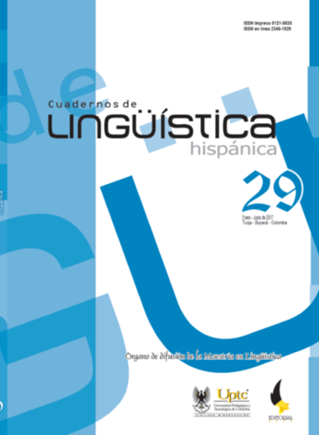Description and Reference: Language as a Possibility for Veracity. A Matter of World-System Limits and Speech Acts

Abstract
This article deals with the concept of language, and the way in which, as a manmade artifact, it can be understood as a means of representation and expression, with the pretension of validating the things it does not know -the object- as well as the way to know them. In that way, we draw from the idea of language as a system, a social semiotics and an intention. Through language and the communicative act of interlocution, the subject determines the veracity and validity of a fact. Linguistic action performs in the system and for the system, and establishes the level of agreement between the idea -whether it be thought or made manifest- and the object, as a final product of its ability to act and communicate. Our thesis is that, regardless of the way or ways in which linguistic codes are combined, what really matters is their capacity for veracity. In the same way, these levels and possibilities are limited or amplified by the world-systems in which the speaking subjects are involved.Keywords
Language, Veracity, Knowledge, Description, Reference, World-System
Author Biography
Francisco Luis Giraldo Gutiérrez
Doctor en Filosofía (Escuela de Teología y Filosofía), de la Universidad Pontificia Bolivariana. Coordinador Maestría CTS+i. Docente Investigador (Facultad de Artes y Humanidades), del Instituto Tecnológico Metropolitano.
David Alberto Londoño Vásquez
Doctor en Ciencias Sociales, Niñez y Juventud (CINDE), Universidad de Manizales. Docente Tiempo Completo de la Institución Universitaria de Envigado.
References
- Austin, J. (1962). How to Do Things With Words (2nd edition). Cambridge: Harvard University Press.
- Beaugrande, R., & Dressler, W. (1997). Introducción a la Lingüística del texto. Barcelona: Ariel Lingüística.
- Eco, U. (1977). Tratado de Semiótica General. Barcelona: Lumen.
- Frege, G. (2005). Sobre sentido y Referencia. En: L. Váldes. La Búsqueda de significado. Lecturas de filosofía del lenguaje (pp. 29-49). Madrid: Tecnos.
- Grice, P. (1975). Logic and Conversation. En: P. Grice (1989). Studies in the Way of Words. Boston: Harvard University.
- Habermas, J. (1989). Teoría de la acción comunicativa. Complementos y estudios previos. Madrid: Cátedra.
- Halliday, M.A.K. (1982). El lenguaje como semiótica social. México: Fondo de Cultura Económica.
- Londoño, D., Rendón, J., & Marín, G. (2011). Las utopias racionalista y deliberativa: El sujeto moral kantiano y su tripartición habermasiana como formas optimistas de la política. Revista Virtual Universidad Católica del Norte, 33. Medellín: Universidad Católica del Norte.
- Marín, M. (2004). Lingüística y enseñanza de la lengua. Buenos Aires: AIQUE.
- Niño, V. (2013). Semiótica y lingüística: fundamentos. Bogotá: ECOE Ediciones.
- Platón. (1988). En: Parménides, Teeteto, Sofista, Político. Madrid: Editorial Gredos. S. A.
- Puerta, C., & Sánchez, L. (2012). Análisis lingüístico de la retroalimentación en educación virtual. En: A. Sánchez (Ed.). El Análisis lingüístico como estrategia de alfabetización académica. Santa Rosa de Osos: Fundación Universitaria Católica del Norte.
- Rendón, J., Londoño, D., & Marín, G. (2013). El papel postmoderno de la identidad personal: El lugar de la subjetividad en el giro hermenéutico. Revista Virtual Universidad Católica del Norte, 40. Medellín: Universidad Católica del Norte.
- Russell, B. (2005). En: L. Váldés. En la búsqueda del significado. Lecturas de Filosofía del lenguaje (pp. 50-60). Madrid: Técnos.
- Santamaría, F. (2009). Hacer mundos: El nombrar y la significatividad. una investigación desde la Filosofía Analítica. Bogotá: Universidad Santo Tomás.
- Saussure, F. (1961). Curso de lingüística general. Buenos Aires: Losada.
- Searle, J. (2005a). ¿Qué es un acto de habla? En: L. Váldes. La Búsqueda de significado. Lecturas de filosofía del lenguaje (pp. 431-447). Madrid: Tecnos.
- Searle, J. (2005b). Nombres propios y descripciones. En: L. Váldes. La Búsqueda de significado. Lecturas de filosofía del lenguaje (pp. 105-115). Madrid: Tecnos.
- Van Dijk, T. (1999). Ideología. Barcelona: Gedisa.
- Wittgenstein, L. (2009). Tractatus logico-philosophicus. Madrid: Editorial Gredos S, S.A.
Downloads
Download data is not yet available.
